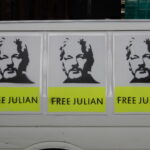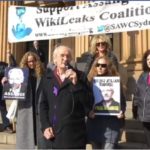Silence as Closest Allies Continue Extralegal Detention of Assange, 1,000 Days On

Reporters Without Borders marked the thousandth day that Julian Assange has been detained in London’s Belmarsh maximum security prison on Wednesday, with a message highlighting that the Wikileaks founder has been targeted not for any crimes, but for his “contributions to journalism”.
British police stormed the Ecuadorian embassy on 14 April 2019 and arrested Assange on behalf of both UK and US authorities. And while the sentence for a minor local breach of bail offence expired in September that year, he’s since been remanded on behalf of Washington.
Over the last two years, Doctors for Assange have been warning the UK and Australian governments that the WikiLeaks founder’s mental and physical health has deteriorated to such a degree that if he isn’t released from his torturous prison setting, he could die in there.
Although Assange’s failing health is no secret.
The original extradition hearing resulted in a January 2021 finding that saw District Judge Vanessa Baraitser uphold Washington’s entire case against the journalist, but then further rule he wouldn’t be sent to the US, as it couldn’t guarantee he wouldn’t take his own life in its harshest prison setting.
This then paved the way for the US to simply provide the UK High Court on appeal, with assurances that it wouldn’t subject Julian to its severest detention conditions.
But Washington also reserved the right to change its mind on this point, after it has the Australian citizen in its custody. And in December, the highest court in Britain ruled this was good enough for it.
The crime of journalism
There are many aspects to the prosecution and the treatment of Assange that are on the nose. The US is trying to extradite him over 17 espionage charges, and one count of computer hacking, due to alleged crimes conducted outside of its jurisdiction and based partially on false evidence.
Yet, it’s clear that Washington wants to get their hands on the multi award-winning journalist because he published volumes of classified US government files over 2010 and 2011, which revealed thousands of American war crimes and questionable diplomatic approaches.
And while the Obama administration eventually dropped the pursuit of the Townsville-born man, Trump picked up the case in 2017, after Assange had gotten hold of the CIA’s Vault 7 hacking manual and exposed the extralegal capabilities the intelligence agency has to surveil the globe’s citizens.
The publishing of Vault 7 led Trump-appointed CIA head Mike Pompeo to label Wikileaks a “non-state hostile intelligence service”, and the White House went on to contemplate kidnapping Assange in London, or even assassinating him, prior to its taking the criminal justice route.
Blood on its hands
Assange’s legal team filed to appeal the greenlighting of US extradition to the UK Supreme Court in late December. While, on Wednesday this week, WikiLeaks supporters gathered out the front of Belmarsh gaol to mark his thousandth day inside and to call for his immediate release.
But back in his home country not much was said about the plight of the Australian son. Prime minister Scott Morrison has consistently refused to publicly broach the journalist’s prolonged detainment in London, even with the stark disregard for due process involved in his case.
Indeed, it would be expected that an official in the position that Morrison holds would attempt to intervene as an Australian citizen is slowly tortured in a very public manner to the point that he may lose his life, especially when it’s this nation’s two closest allies conducting the assault.
Then again, a great number of Australians have lost faith and respect in the Morrison government, with its tendency to no longer adhere to democratic principles, or even to follow the rule of law, which is the exact sort of politicking Assange has been at pains to expose.







